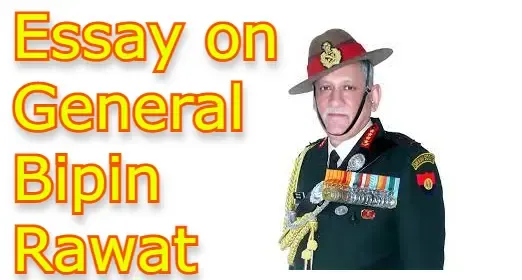Essay on General Bipin Rawat
"He was the high military officer of India,
He had a devotion to the country, he was dearer than life."
General Bipin Singh Rawat was an Indian military officer. He was a general of the Indian Army. He was born Born on 16 March 1958 in Pauri, Uttarakhand. His father, Laxman Singh Rawat also served in the Indian Army was General Bipin Singh Rawat First Chief of India
Defence Staff (CDS). He served as the CDS of the Indian Armed Forces from January 2020 till his death. He received his formal education at Cambrian Hall School in Dehradun and St. Edward's School in Shimla. He later joined the National Defense Academy, Khadakwasla and the Indian Military Academy, Dehradun, where he was awarded the Sword of Honour. In January 979, he got his first appointment in the army in Mizoram and during his deployment in the NEFA area, he led the battalion.
Rawat took over as the Vice Chief of the Army Staff on 01 September 2016. This was soon followed by the 27th venue in December 2016.
Appointed as Chief of Army Staff. He was also the Honorary General of the Nepalese Army. With a career spanning nearly 43 years
During this he received Param Vishisht Seva Medal, Uttam Yudh Seva Medal, Ati Vishisht Seva Medal, Yudh Seva Medal, Sena Medal,
Awarded for Gallantry and Distinguished Service with the Vishisht Seva Medal, COAS Commendation
On 8 December 2021, a helicopter in Coonoor, Tamil Nadu, He died in the accident.
"He was a brave son of the country and the heroes do not die they are called martyrs then in some form, Make eye to eye with the enemy. Heroes don't die they are called martyrs.. they become immortal. "
Thank you so much

Comments
Post a Comment